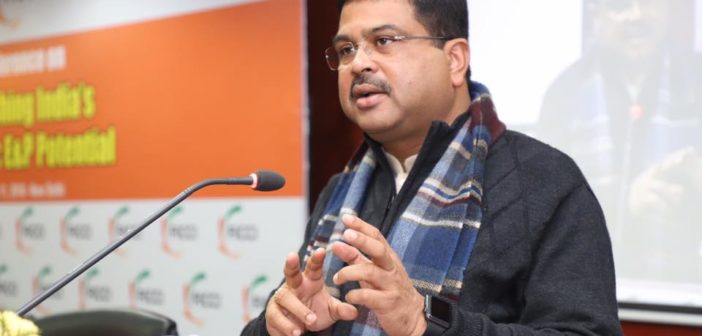“We are committed to a gas-based economy”: Dharmendra Pradhan
Pradhan defended market pricing for petrol and diesel, saying the decision to deregulate these fuels were well thought through. In markets, where these fuels are available cheaply, these are available only to a smaller section of consumers, Pradhan said, citing the negative consequences of having administered prices. Petrol and diesel prices have been rising in the country in line with rise in international rates for the past few months, Reports Amitabh Kumar in Governance Democracy&Politics (GDP) Magazine’s, January Issue
Petroleum and Natural Gas Regulatory Board (PNGRB) will begin the process to auction gas distribution licenses for hundred cities this month, Oil Minister Dharmendra Pradhan has said.
The government has been encouraging the consumption of natural gas, aiming to raise the share of gas in country’s energy mix from the current 6.5% to 15% in future. Expansion of gas distribution networks to more cities can help boost consumption by households, vehicles and factories.
PNGRB, the downstream regulator, has already given away gas distribution licenses for about 80 cities across the country, and a roll out of 100 more licenses can potentially boost gas consumption sharply. But city gas auctions in the past have been marred by declining interest from the industry, delays and policy hurdles, resulting in far fewer than targeted distribution of licenses. India has about 1,282 compressed natural gas (CNG) stations and about 40 lakh domestic piped gas consumers. For more than a year, the regulator didn’t have enough board members to be able to quickly decide or award licenses. But with vacancies having filled recently, the board is likely to get back to its job faster.
The government is also targeting to aggressively expand pipelines to secure gas supplies to more and more cities. GAIL, ONGCBSE 0.20 %, BPCL, Indian Oil and Oil India are together planning to build a gas grid in North-East and link it to the Jagdishpur-Haldia pipeline pipeline, currently under construction, Pradhan said. GAILBSE -0.27 % is building the 2500-km Jagdishpur-Haldia pipeline, with the financial support from Centre.
The government is also working on bringing the second wave of reforms in the oil and gas sector, Pradhan said, without elaborating. He, however, rejected the idea of letting the Directorate General of Hydrocarbons (DGH) evolve into an independent regulator with its cadre of experts, arguing that India’s upstream sector is yet to mature for that. DGH is the technical arm of the Oil Ministry and also acts as a regulator of the upstream sector but depends mainly on the borrowed personnel from state oil companies.
Pradhan also defended market pricing for petrol and diesel, saying the decision to deregulate these fuels were well thought through. In markets, where these fuels are available cheaply, these are available only to a smaller section of consumers, Pradhan said, citing the negative consequences of having administered prices. Petrol and diesel prices have been rising in the country in line with rise in international rates for the past few months.
Dharmendra Pradhan reiterated that government is committed to a gas-based economy for the country and his ministry is moving closer to that. He said the Petroleum Ministry is making efforts to use its energy reserves in an environment friendly manner which includes generating synthetic gas from Coal, enhancing production using EOR technologies, promoting biofuels and converting agricultural & municipal wastes to Ethanol and dropping quality fuel.
He was speaking at a seminar organized by industry body FICCI. Pradhan said as part of this commitment his ministry has initiated many plans including the government-owned gas utility GAIL (India) Ltd eastern India project and setting up coal to gas conversion plants in Odisha. “GAIL India will set up coal to synthetic gas plants in Odisha. This synthetic gas is expected to be cheaper than domestic gas,” Pradhan said.
Oil Minister Rules Out Upstream Oil Gas Regulator
Oil minister Dharmendra Pradhan virtually ruled out giving statutory powers to upstream oil and gas regulator DGH, saying the sector has not fully developed and needs government support. There are two regulatory bodies in the oil and gas sector – the Petroleum and Natural Gas Regulatory Board, which is a regulator for the downstream activities like laying of pipelines and fuel marketing but without powers to review pricing.
Importantly Directorate General of Hydrocarbons (DGH) is a technical arm of the oil ministry which overseas upstream oil and gas exploration and production activities. Various committees have suggested creation of an independent, statutory regulator for the upstream oil sector.
Ironically in the FICCI seminar, PwC in a presentation reiterated the demand, calling for DGH to be made a statutory body like market regulator Sebi.
Responding to this, Pradhan said the sector has not developed fully and still looks at the government for reforms. “Does a sector which has not developed fully, a sector which expects government to do reforms, should be talk of that,” he said. He said it was not right to put “jargons” like statutory regulator for the sector.
In 2013, a committee, headed by former finance secretary Vijay Kelkar, had recommended hiving off the DGH’s financial oversight function and vesting it with the income tax authorities. It recommended that the ministry and the DGH should restrict themselves to the technical oversight of contractors.
The DGH currently manages petroleum resources besides monitoring production sharing contracts (PSCs), and assists the government in auctioning oil and gas exploration fields. It is manned by staff drawn on deputation or tenure basis, mainly from state-owned firms like ONGC and OIL.
Kelkar panel had stated that “DGH needs to create an HR pool by hiring the best talents.” Parliamentary standing committees too have recommended an independent upstream regulator.In 2011, a panel led by former finance secretary Ashok Chawla advised the government to turn the DGH into an ‘independent technical office’ attached to the oil ministry and establish an upstream regulator to focus on regulatory functions. It also said the reconstituted DGH as well as the regulator must not have staff on deputation from regulated firms.





